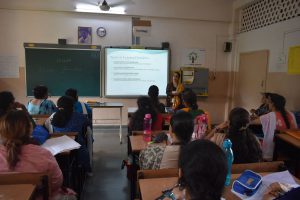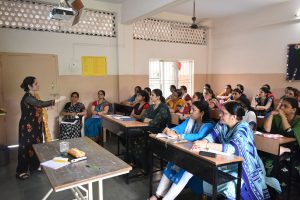Report on learning difficulty
“label jars and not people”
Teachers are often the first to notice that a child has a learning disorder. Sometimes the signs are easy to spot, like a student who’s way behind in reading. Or a child who’s working hard but just keeps failing tests. But sometimes the signs are harder to see. And that can mean kids who need help don’t get it.
The school counsellor sensitized the teachers of pre-primary and primary on the learning difficulties faced by the students through ppts, videos and a one to one interaction.Post covid the kids who were diagnosed as slow learners or children with learning difficulty have gone back to where they had started from,due to discontinuation of therapies.
Kids with LDs often have a big gap between what it seems like they should be able to do and what they’re actually able do. For example, a student who writes awesome essays but can barely do basic math assignments. Or a kid who gives great answers class but can’t get their ideas down on paper. These gaps often cause kids with learning disorders to be labelled as lazy or told to just try harder, which can take a toll on their self-esteem. Knowing what to look for can help teachers and parents get kids the help they need. The teacher must be able to determine if a child is exhibiting an alternate learning pattern or if the child has a learning problem. If the teacher suspect there is a learning problem then it is necessary to seek assistance from the experts.
Students who need constant reminders of what to do next might be struggling with a skill called working memory. That’s the task of remembering and processing new information, a common issue for kids with LDs. They also may struggle with time management. They may have trouble with transitions or seem disorganized.
Other common signs of learning differences include difficulty following directions, trouble concentrating, and not getting homework done on time — or at all. Failing tests, especially ones you know they’ve studied for, is also a sign.
Secondly the good teacher will make it a point to not let other kids make fun of the child having learning issues. It is really important to keep the motivation level high of the kids. They should not feel alone or left out; this feeling of “being different” can leave a mark on their self esteem. The teacher has to have patience and make sure that the child is not developing a dislike towards a particular subject or school.
Making statements like, “ You are good for nothing”, “ You can do nothing in your life”, “ Your parents have not taught you properly”, “ You are acting so as to get excused from class work”, “ You are dumb, you cannot get decent marks in test” will demoralize the child and it leave create a huge dent on self esteem.
Helping students with learning disabilities get the help they need can make a big difference both in school and out — and for years to come.







